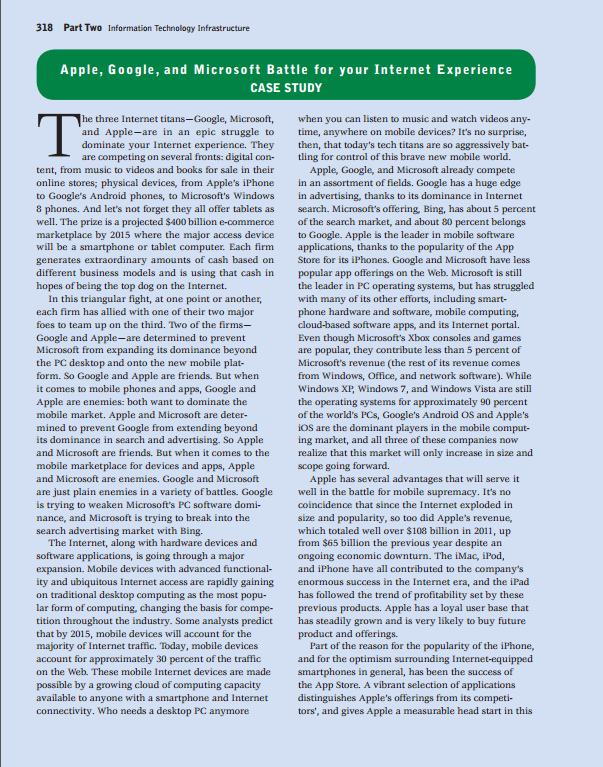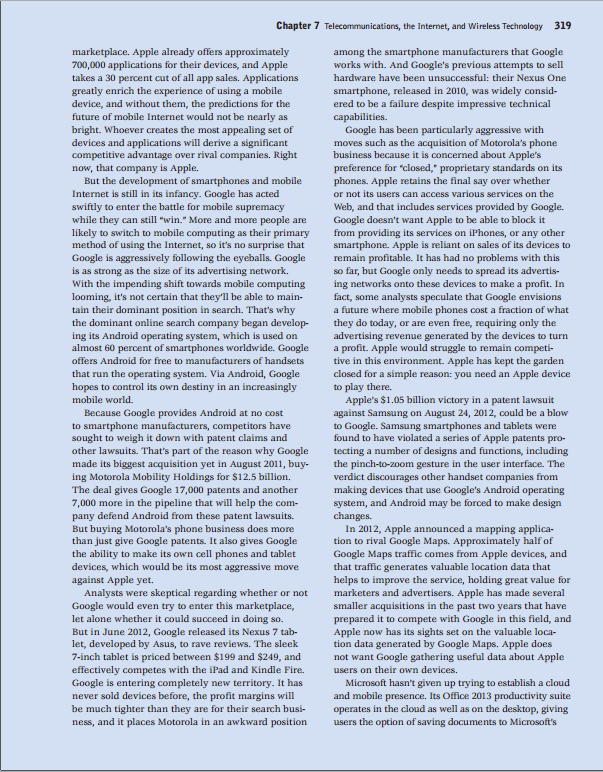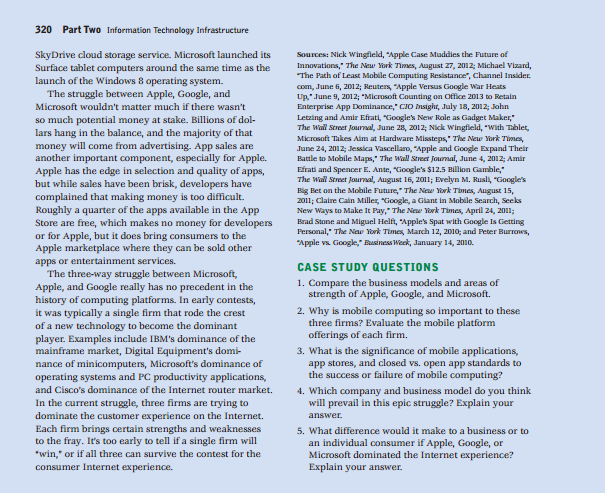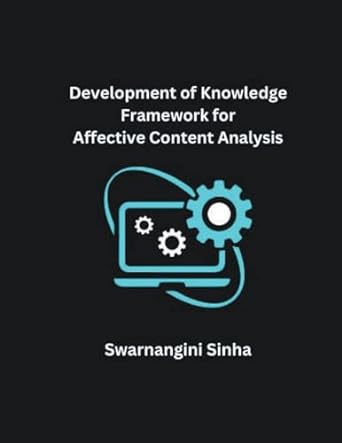Answered step by step
Verified Expert Solution
Question
1 Approved Answer
Management Information System (13th edition) - Kenneth C. Laudon & Jane P. Laudon 318 Part Two Information Technology Infrastructure Apple, Google, and Microsoft Battle for



Management Information System (13th edition) - Kenneth C. Laudon & Jane P. Laudon
318 Part Two Information Technology Infrastructure Apple, Google, and Microsoft Battle for your Internet Experience CASE STUDY T he three Internet titans-Google, Microsoft, and Apple-are in an epic struggle to dominate your Internet experience. They are competing on several fronts: digital con- tent, from music to videos and books for sale in their online stores; physical devices, from Apple's iPhone to Google's Android phones, to Microsoft's Windows 8 phones. And let's not forget they all offer tablets as well. The prize is a projected $400 billion e-commerce marketplace by 2015 where the major access device will be a smartphone or tablet computer. Each firm generates extraordinary amounts of cash based on different business models and is using that cash in hopes of being the top dog on the Internet. In this triangular fight, at one point or another, each firm has allied with one of their two major foes to team up on the third. Two of the firms- Google and Apple-are determined to prevent Microsoft from expanding its dominance beyond the PC desktop and onto the new mobile plat- form. So Google and Apple are friends. But when it comes to mobile phones and apps, Google and Apple are enemies: both want to dominate the mobile market. Apple and Microsoft are deter- mined to prevent Google from extending beyond its dominance in search and advertising. So Apple and Microsoft are friends. But when it comes to the mobile marketplace for devices and apps, Apple and Microsoft are enemies. Google and Microsoft are just plain enemies in a variety of battles. Google is trying to weaken Microsoft's PC software domi- nance, and Microsoft is trying to break into the search advertising market with Bing. The Internet, along with hardware devices and software applications, is going through a major expansion. Mobile devices with advanced functional- ity and ubiquitous Internet access are rapidly gaining on traditional desktop computing as the most popu- lar form of computing, changing the basis for compe- tition throughout the industry. Some analysts predict that by 2015, mobile devices will account for the majority of Internet traffic. Today, mobile devices account for approximately 30 percent of the traffic on the Web. These mobile Internet devices are made possible by a growing cloud of computing capacity available to anyone with a smartphone and Internet connectivity. Who needs a desktop PC anymore when you can listen to music and watch videos any- time, anywhere on mobile devices? It's no surprise, then, that today's tech titans are so aggressively bat- tling for control of this brave new mobile world. Apple, Google, and Microsoft already compete in an assortment of fields. Google has a huge edge in advertising, thanks to its dominance in Internet search. Microsoft's offering, Bing, has about 5 percent of the search market, and about 80 percent belongs to Google. Apple is the leader in mobile software applications, thanks to the popularity of the App Store for its iPhones. Google and Microsoft have less popular app offerings on the Web. Microsoft is still the leader in PC operating systems, but has struggled with many of its other efforts, including smart- phone hardware and software, mobile computing, cloud-based software apps, and its Internet portal. Even though Microsoft's Xbox consoles and games are popular, they contribute less than 5 percent of Microsoft's revenue (the rest of its revenue comes from Windows, Office, and network software). While Windows XP, Windows 7, and Windows Vista are still the operating systems for approximately 90 percent of the world's PCs, Google's Android OS and Apple's iOS are the dominant players in the mobile comput- ing market, and all three of these companies now realize that this market will only increase in size and scope going forward. Apple has several advantages that will serve it well in the battle for mobile supremacy. It's no coincidence that since the Internet exploded in size and popularity, so too did Apple's revenue, which totaled well over $108 billion in 2011, up from $65 billion the previous year despite an ongoing economic downturn. The iMac, iPod, and iPhone have all contributed to the company's enormous success in the Internet era, and the iPad has followed the trend of profitability set by these previous products. Apple has a loyal user base that has steadily grown and is very likely to buy future product and offerings. Part of the reason for the popularity of the iPhone, and for the optimism surrounding Internet-equipped smartphones in general, has been the success of the App Store. A vibrant selection of applications distinguishes Apple's offerings from its competi- tors', and gives Apple a measurable head start in this Chapter 7 Telecommunications, the Internet, and Wireless Technology 319 marketplace. Apple already offers approximately among the smartphone manufacturers that Google 700,000 applications for their devices, and Apple works with. And Google's previous attempts to sell takes a 30 percent cut of all app sales. Applications hardware have been unsuccessful: their Nexus One greatly enrich the experience of using a mobile smartphone, released in 2010, was widely consid- device, and without them, the predictions for the ered to be a failure despite impressive technical future of mobile Internet would not be nearly as capabilities. bright. Whoever creates the most appealing set of Google has been particularly aggressive with devices and applications will derive a significant moves such as the acquisition of Motorola's phone competitive advantage over rival companies. Right business because it is concerned about Apple's now, that company is Apple. preference for "closed," proprietary standards on its But the development of smartphones and mobile phones. Apple retains the final say over whether Internet is still in its infancy. Google has acted or not its users can access various services on the swiftly to enter the battle for mobile supremacy Web, and that includes services provided by Google. while they can still "win." More and more people are Google doesn't want Apple to be able to block it likely to switch to mobile computing as their primary from providing its services on iPhones, or any other method of using the Internet, so it's no surprise that smartphone. Apple is reliant on sales of its devices to Google is aggressively following the eyeballs. Google remain profitable. It has had no problems with this is as strong as the size of its advertising network. so far, but Google only needs to spread its advertis- With the impending shift towards mobile computing ing networks onto these devices to make a profit. In looming, it's not certain that they'll be able to main- fact, some analysts speculate that Google envisions tain their dominant position in search. That's why a future where mobile phones cost a fraction of what the dominant online search company began develop- they do today, or are even free, requiring only the ing its Android operating system, which is used on advertising revenue generated by the devices to turn almost 60 percent of smartphones worldwide. Google a profit. Apple would struggle to remain competi- offers Android for free to manufacturers of handsets tive in this environment. Apple has kept the garden that run the operating system. Via Android, Google closed for a simple reason: you need an Apple device hopes to control its own destiny in an increasingly to play there. mobile world. Apple's $1.05 billion victory in a patent lawsuit Because Google provides Android at no cost against Samsung on August 24, 2012, could be a blow to smartphone manufacturers, competitors have to Google. Samsung smartphones and tablets were sought to weigh it down with patent claims and found to have violated a series of Apple patents pro- other lawsuits. That's part of the reason why Google tecting a number of designs and functions, including made its biggest acquisition yet in August 2011, buy- the pinch-to-zoom gesture in the user interface. The ing Motorola Mobility Holdings for $12.5 billion. verdict discourages other handset companies from The deal gives Google 17,000 patents and another making devices that use Google's Android operating 7,000 more in the pipeline that will help the com- system, and Android may be forced to make design pany defend Android from these patent lawsuits. changes. But buying Motorola's phone business does more In 2012, Apple announced a mapping applica- than just give Google patents. It also gives Google tion to rival Google Maps. Approximately half of the ability to make its own cell phones and tablet Google Maps traffic comes from Apple devices, and devices, which would be its most aggressive move that traffic generates valuable location data that against Apple yet. helps to improve the service, holding great value for Analysts were skeptical regarding whether or not marketers and advertisers. Apple has made several Google would even try to enter this marketplace, smaller acquisitions in the past two years that have let alone whether it could succeed in doing so. prepared it to compete with Google in this field, and But in June 2012, Google released its Nexus 7 tab- Apple now has its sights set on the valuable loca- let, developed by Asus, to rave reviews. The sleek tion data generated by Google Maps. Apple does 7-inch tablet is priced between $199 and $249, and not want Google gathering useful data about Apple effectively competes with the iPad and Kindle Fire. users on their own devices. Google is entering completely new territory. It has Microsoft hasn't given up trying to establish a cloud never sold devices before, the profit margins will and mobile presence. Its Office 2013 productivity suite be much tighter than they are for their search busi- operates in the cloud as well as on the desktop, giving ness, and it places Motorola in an awkward position users the option of saving documents to Microsoft's 320 Part Two Information Technology Infrastructure SkyDrive cloud storage service. Microsoft launched its Surface tablet computers around the same time as the launch of the Windows 8 operating system. The struggle between Apple, Google, and Microsoft wouldn't matter much if there wasn't so much potential money at stake. Billions of dol- lars hang in the balance, and the majority of that money will come from advertising. App sales are another important component, especially for Apple. Apple has the edge in selection and quality of apps, but while sales have been brisk, developers have complained that making money is too difficult. Roughly a quarter of the apps available in the App Store are free, which makes no money for developers or for Apple, but it does bring consumers to the Apple marketplace where they can be sold other apps or entertainment services. The three-way struggle between Microsoft, Apple, and Google really has no precedent in the history of computing platforms. In early contests, it was typically a single firm that rode the crest of a new technology to become the dominant player. Examples include IBM's dominance of the mainframe market, Digital Equipment's domi- nance of minicomputers, Microsoft's dominance of operating systems and PC productivity applications, and Cisco's dominance of the Internet router market. In the current struggle, three firms are trying to dominate the customer experience on the Internet. Each firm brings certain strengths and weaknesses to the fray. It's too early to tell if a single firm will *win,' or if all three can survive the contest for the consumer Internet experience. Sources: Nick Wingfield, "Apple Case Muddies the Future of Innovations, The New York Times, August 27, 2012, Michael Vizard, "The Path of Least Mobile Computing Resistance", Channel Insider com, June 6, 2012; Reuters, "Apple Versus Google War Heats Lip." June 9, 2012; "Microsoft Counting on Office 2013 to Retain Enterprise App Dominance," CIO Insight, July 18, 2012, John Letzing and Amir Efrati, "Google's New Role as Gadget Maker," The Wall Street Journal, June 28, 2012, Nick Wingfield, "With Tablet, Microsoft Takes Almat Hardware Missteps, The New York Times, June 24, 2012, Jessica Vascellano, "Apple and Google Expand Their Battle to Mobile Maps." The Wall Street Journal, June 4, 2012, Amir Efrati and Spencer E. Ante, "Google's $12.5 Billion Gamble," The Wall Street Journal, August 16, 2011; Evelyn M. Rusli, "Google's Big Bet on the Mobile Future, " The New York Times, August 15, 2011; Claire Cain Miller, "Google, a Glant in Mobile Search, Seeks New Ways to Make It Pay." The New York Times, April 24, 2011; Brad Stone and Miguel Helft, "Apple's Spat with Google Is Getting Personal, The New York Times, March 12, 2010; and Peter Burrows, Apple vs Google." Business Week, January 14, 2010. CASE STUDY QUESTIONS 1. Compare the business models and areas of strength of Apple, Google, and Microsoft. 2. Why is mobile computing so important to these three firms? Evaluate the mobile platform offerings of each firm. 3. What is the significance of mobile applications, app stores, and closed vs. open app standards to the success or failure of mobile computing? 4. Which company and business model do you think will prevail in this epic struggle? Explain your answer. 5. What difference would it make to a business or to an individual consumer if Apple, Google, or Microsoft dominated the Internet experience? Explain yourStep by Step Solution
There are 3 Steps involved in it
Step: 1

Get Instant Access to Expert-Tailored Solutions
See step-by-step solutions with expert insights and AI powered tools for academic success
Step: 2

Step: 3

Ace Your Homework with AI
Get the answers you need in no time with our AI-driven, step-by-step assistance
Get Started


